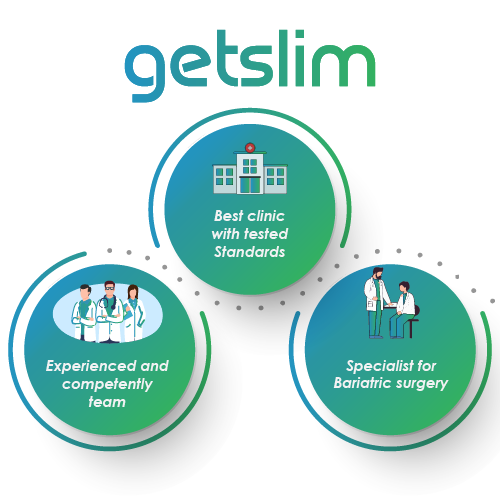Opportunities and Risks of Gastric Reduction
Gastric Reduction – Risks and Opportunities
People suffering from obesity have a higher risk of various chronic comorbidities, including diabetes and heart disease. With the help of gastric reduction, not only can body weight be reduced, but the risk of obesity-related comorbidities also decreases significantly.
Gastric Reduction Reduces the Risk of Comorbidities Associated with Obesity
If pre-existing diabetes or hypertension is present, a significant improvement in these conditions can occur after gastric reduction. Bariatric surgery can even mean remission of pre-diabetes. Often, gastric reduction can alleviate high blood pressure and reduce the need for medication in patients.
Weighing the Pros and Cons of Gastric Reduction Carefully
Gastric reduction is a major surgery and is not recommended for individuals who only have a few kilos of excess weight to lose. However, for patients who meet the criteria and have already tried other weight loss methods without success, gastric reduction can be the key to permanent weight loss, relief from associated psychological stress, and the start of a healthier lifestyle. Nevertheless, it is important to consider both the benefits and risks and understand the lifelong commitment that this type of option requires.
Short-Term Risks and Side Effects of Gastric Sleeve
All surgical procedures carry risks, and the risks and side effects vary depending on the bariatric procedure. Your surgeon will explain all possible short-term and long-term surgical risks and answer any questions before you decide on gastric reduction.
The most common postoperative risks and side effects associated with gastric reduction are:
- Acid reflux
- Anesthesia risks
- Chronic nausea and vomiting
- Esophageal dilation
- Inability to eat certain foods
- Infection
- Stomach obstruction
Long-Term Risks and Side Effects of Gastric Reduction
Bariatric surgery also carries some long-term risks for patients and side effects that may develop years after the procedure and become problematic. Among these potential long-term complications of gastric reduction is the so-called dumping syndrome. This is a condition that can lead to symptoms such as nausea and dizziness. Furthermore, after gastric reduction, low blood sugar, malnutrition, frequent vomiting, ulcers, intestinal obstruction, or hernias can occur.
Managing Realistic Expectations
It’s important to know that the amount of weight lost through surgery varies. There is no guarantee that the surgery will be successful. If dietary guidelines are not followed, weight may return. Additionally, extreme weight loss can lead to cosmetic issues such as excessive loose skin.
A Lifetime Commitment
Surgery is just a tool to accelerate weight loss. Patients who follow medically recommended dietary, exercise, and lifestyle changes have the best chance of lifelong success. Individuals undergoing gastric surgery in Antalya should visit a doctor several times a year for regular check-ups for the rest of their lives. Patients must demonstrate that their weight loss attempts through lifestyle changes have been unsuccessful before the surgery is approved.
Most surgeons also require their patients to show serious motivation and a clear understanding of the extensive dietary, exercise, and medical guidelines that must be followed for the rest of their lives after gastric surgery.





